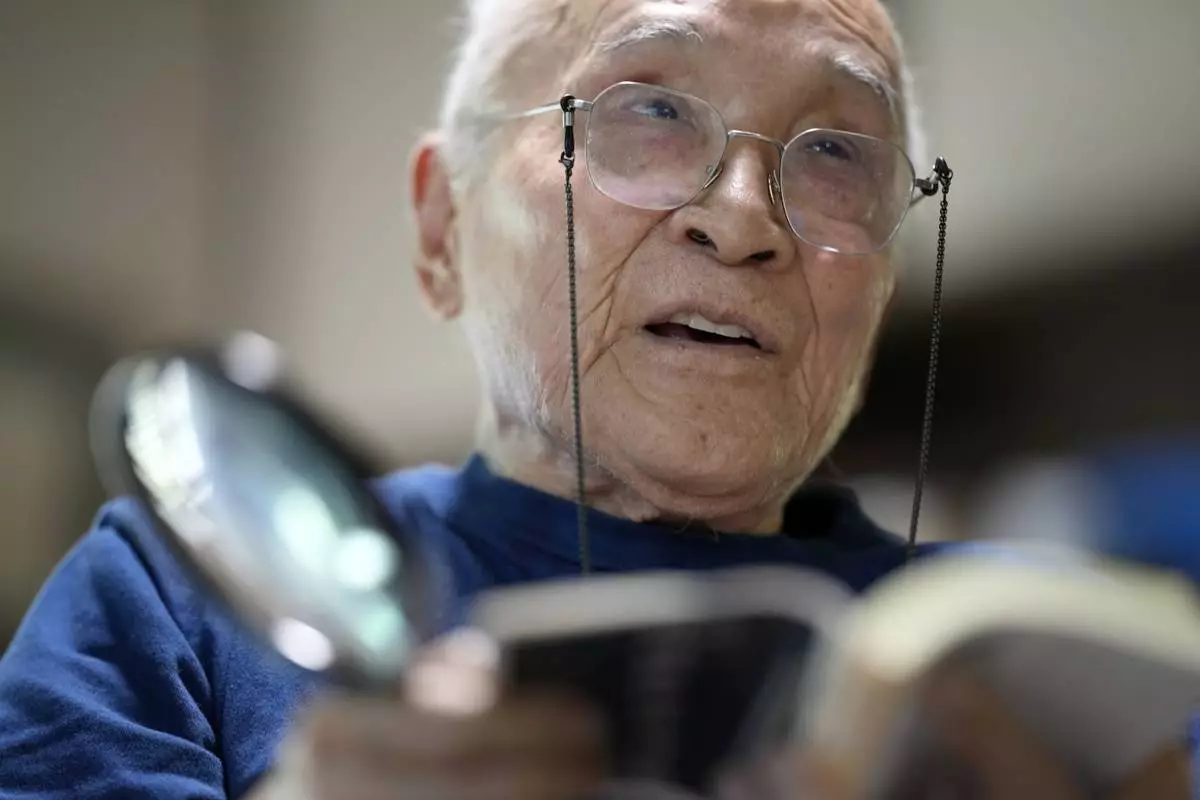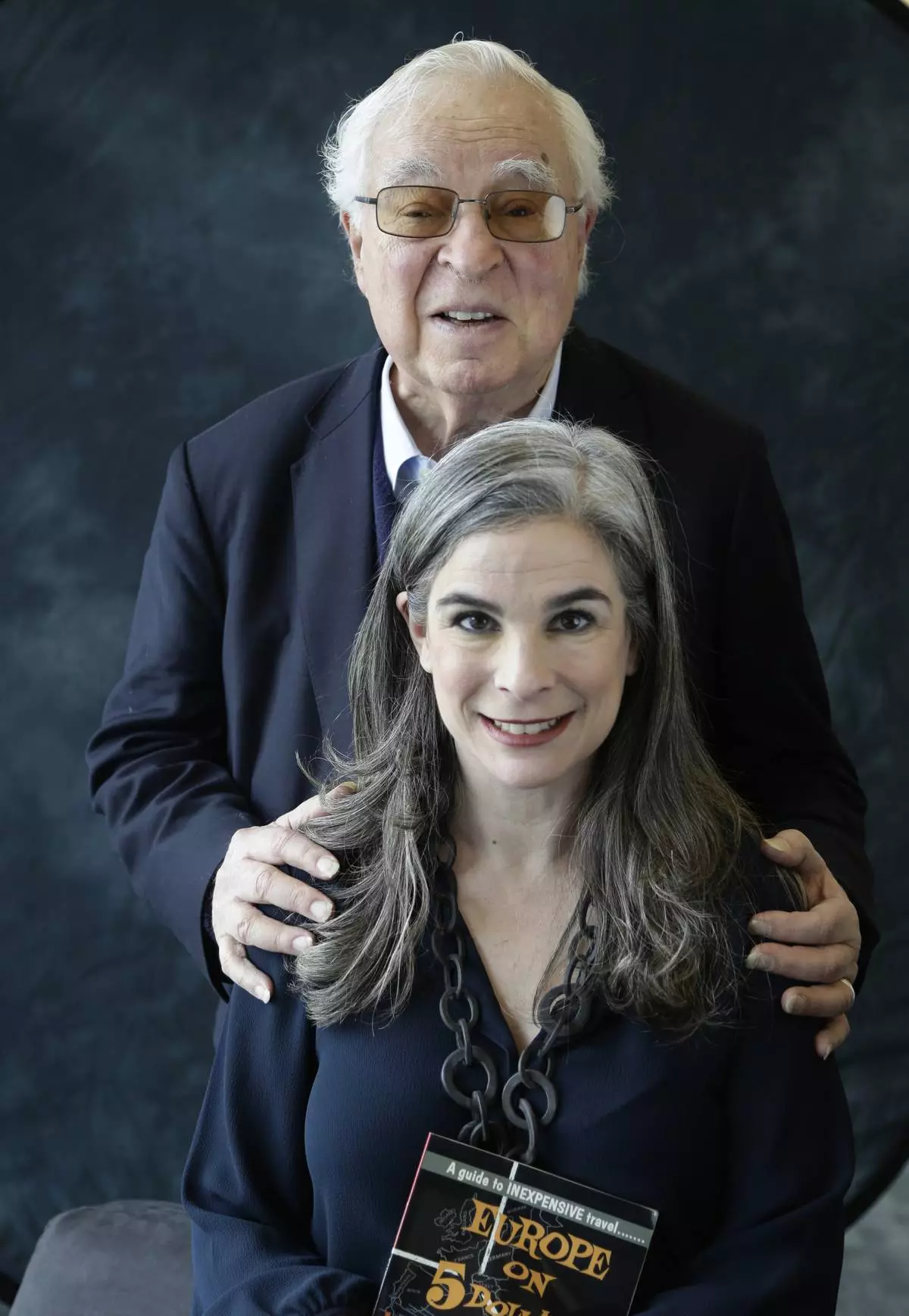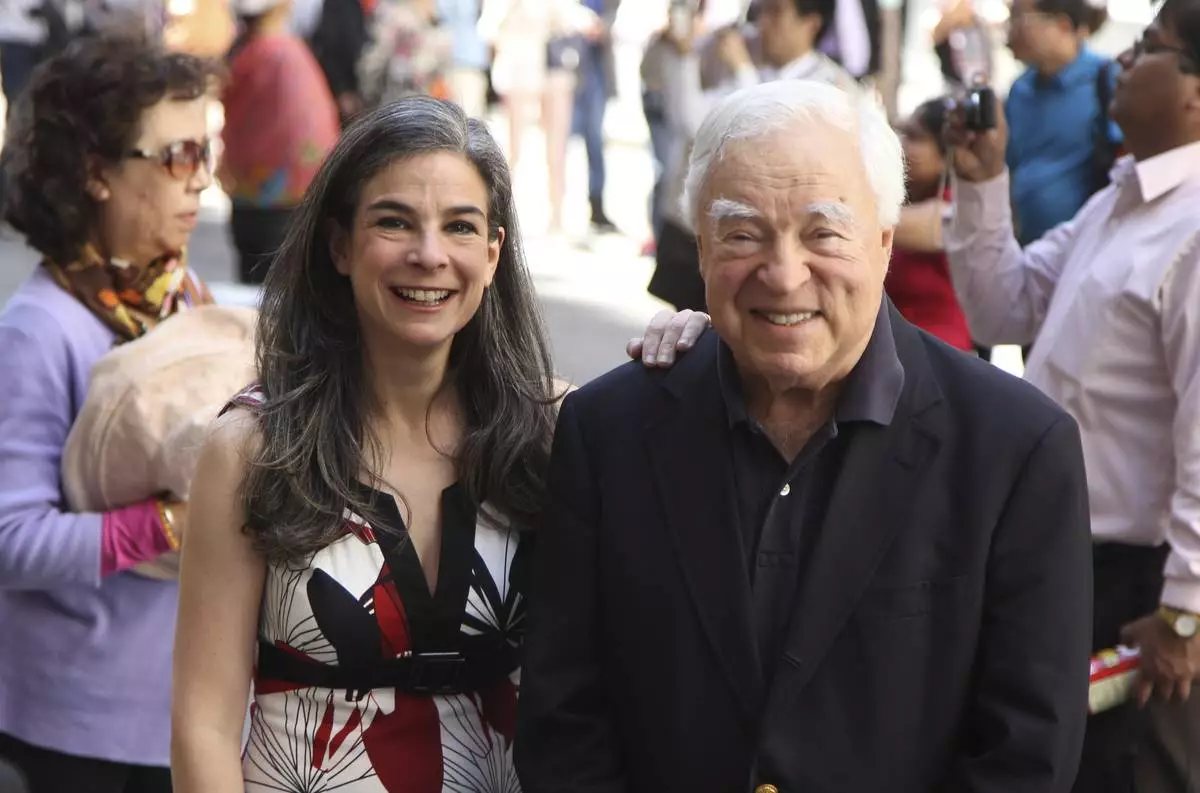TOKYO (AP) — Shuntaro Tanikawa, who pioneered modern Japanese poetry, poignant but conversational in its divergence from haiku and other traditions, has died. He was 92.
Tanikawa, who translated the “Peanuts” comic strip and penned the lyrics for the theme song of the animation series “Astro Boy,” died Nov. 13, his son Kensaku Tanikawa said Tuesday. He said his father died at a Tokyo hospital due to old age.
Shuntaro Tanikawa stunned the literary world with his 1952 debut “Two Billion Light Years of Solitude,” a bold look at the cosmic in daily life, sensual, vivid but simple in its use of everyday language. Written before Gabriel García Márquez’ “One Hundred Years of Solitude,” it became a bestseller.
Tanikawa’s “Kotoba Asobi Uta,” or “Word Play Songs,” is a rhythmical experiment in juxtaposing words that sound similar, such as “kappa,” a mythical animal and “rappa,” a horn, that makes for a joyful singsong compilation, filled with alliterations and onomatopoeia.
“For me, the Japanese language is the ground. Like a plant, I place my roots, drink in the nutrients of the Japanese language, sprouting leaves, flowers and bearing fruit,” he said in a 2022 interview with The Associated Press at his Tokyo home.
Tanikawa explored the poetic, not only in the repetitive music of the spoken word but also the magic hidden in little things.
One of his works is titled, “I wanted to talk to you in the kitchen in the middle of the night.”
“In the past, there was something about it being a job, being commissioned. Now, I can write as I want,” he said.
In every work Tanikawa tackled, including the script for Kon Ichikawa’s “Tokyo Olympiad," a documentary film of the 1964 Tokyo Games, the respectful love for the beauty of the Japanese language resonates.
He also translated Mother Goose, Maurice Sendak and Leo Lionni. Tanikawa has in turn been widely translated, including English, Chinese and various European languages.
Some of his works were made into picture books for children, and they are often featured in Japanese school textbooks. He also incorporated Japanese words derived from foreign origins into his poems like Coca-Cola.
In his prose poem with that title, in which a boy is opening a Coke can, he wrote: “If, for instance, he saw the infinite universe that started or ended at the tip of his can, he was totally unaware of it. One might be able to opine that he named every bit of the unknown about to swallow him with all the vocabulary he could muster, which included his future vocabulary that was yet dormant in his subconscious.”
In his debut poem that catapulted him to stardom, he is more sparse:
“Because the universe goes on expanding, we are all uneasy. With the chill of two billion light-years of solitude, I suddenly sneezed,” is the way the poem ends, as translated by William I. Elliott and Kazuo Kawamura.
When asked about it, Tanikawa acknowledged it felt as though someone else had written it, but noted he still thought it was a good poem.
“Tanikawa’s poetry reflects a metaphysical and quasi-religious attitude toward experience. In simple, spare language, he sketches profound ideas and emotional truths,” according to the Poetry Foundation, a U.S. literary organization.
Tanikawa was born in 1931, a son of philosopher Tetsuzo Tanikawa, and began writing poetry in his teens, circulating with the famous poets of that era, like Makoto Ooka and Shuji Terayama.
He said he used to think poems descended like an inspiration from the heavens. But, as he grew older, he felt the poems welling up from the ground.
In person, Tanikawa was friendly and unassuming, often reading in public with other poets. He never seemed to take himself too seriously but used to confess his one regret in life was never finishing his education, having dropped out amid stardom at a young age.
His relative isolation from the bleakly serious scholarly poetry scene of postwar Japan likely helped him take his free-verse approach that went on to innovate and define Japanese contemporary poetics.
Tanikawa said he wasn’t afraid of death, implying he perhaps meant to write a poem about that experience, too.
“I am more curious about where I will go when I die. It’s a different world, right? Of course, I don’t want pain. I don’t want to die after major surgery or anything. I just want to die, all of a sudden,” he said.
He is survived by his son, musician Kensaku Tanikawa and daughter Shino and several grandchildren. Funeral services were held privately with family and friends. A farewell event in his honor is being planned, Kensaku Tanikawa said.
“As they did with all of you, Shuntaro’s poems stunned and moved me, making me chuckle or shed a tear. Wasn’t it all so fun?” he said. “His poems are with you forever.”
Yuri Kageyama is on X: https://x.com/yurikageyama

FILE - Shuntaro Tanikawa, a Japanese poet and translator, speaks during an interview with The Associated Press in Tokyo, on May 25, 2022. (AP Photo/Eugene Hoshiko, File)

FILE - Shuntaro Tanikawa, a Japanese poet and translator, reads his poem during an interview with The Associated Press in Tokyo, on May 25, 2022. (AP Photo/Eugene Hoshiko, File)
NEW YORK (AP) — Arthur Frommer, whose "Europe on 5 Dollars a Day" guidebooks revolutionized leisure travel by convincing average Americans to take budget vacations abroad, has died. He was 95.
Frommer died from complications of pneumonia, his daughter Pauline Frommer said Monday.
“My father opened up the world to so many people," she said. "He believed deeply that travel could be an enlightening activity and one that did not require a big budget.”
Frommer began writing about travel while serving in the U.S. Army in Europe in the 1950s. When a guidebook he wrote for American soldiers overseas sold out, he launched what became one of the travel industry’s best-known brands, self-publishing "Europe on 5 Dollars a Day" in 1957.
"It struck a chord and became an immediate best-seller," he recalled in an interview with The Associated Press in 2007, on the 50th anniversary of the book's debut.
The Frommer’s brand, led today by his daughter Pauline, remains one of the best-known names in the travel industry, with guidebooks to destinations around the world, an influential social media presence, podcasts and a radio show.
Frommer's philosophy — stay in inns and budget hotels instead of five-star hotels, sightsee on your own using public transportation, eat with locals in small cafes instead of fancy restaurants — changed the way Americans traveled in the mid- to late 20th century. He said budget travel was preferable to luxury travel "because it leads to a more authentic experience.” That message encouraged average people, not just the wealthy, to vacation abroad.
It didn’t hurt that his books hit the market as the rise of jet travel made getting to Europe easier than crossing the Atlantic by ship. The books became so popular that there was a time when you couldn’t visit a place like the Eiffel Tower without spotting Frommer’s guidebooks in the hands of every other American tourist.
Frommer’s advice also became so standard that it's hard to remember how radical it seemed in the days before discount flights and backpacks. "It was really pioneering stuff,” Tony Wheeler, founder of the Lonely Planet guidebook company, said in an interview in 2013. Before Frommer, Wheeler said, you could find guidebooks “that would tell you everything about the church or the temple ruin. But the idea that you wanted to eat somewhere and find a hotel or get from A to B -- well, I’ve got a huge amount of respect for Arthur.”
"Arthur did for travel what Consumer Reports did for everything else," said Pat Carrier, former owner of The Globe Corner, a travel bookstore in Cambridge, Massachusetts.
The final editions of Frommer's groundbreaking series were titled "Europe from $95 a Day." The concept no longer made sense when hotels could not be had for less than $100 a night, so the series was discontinued in 2007. But the Frommer publishing empire did not disappear, despite a series of sales that started when Frommer sold the guidebook company to Simon & Schuster. It was later acquired by Wiley Publishing, which in turn sold it to Google in 2012. Google quietly shut the guidebooks down, but Arthur Frommer — in a David vs. Goliath triumph — got his brand back from Google. In November 2013 with his daughter Pauline, he relaunched the print series with dozens of new guidebook titles.
“I never dreamed at my age I’d be working this hard,” he told the AP at the time, age 84.
Frommer also remained a well-known figure in 21st century travel, opinionated to the end of his career, speaking out on his blog and radio show. He hated mega-cruise ships and railed against travel websites where consumers put up their own reviews, saying they were too easily manipulated with phony postings. And he coined the phrase “Trump Slump” in a widely quoted column that predicted a slump in tourism to the U.S. after Donald Trump was elected president.
Frommer was born in Lynchburg, Virginia, and grew up during the Great Depression in Jefferson City, Missouri, the child of a Polish father and Austrian mother. "My father had one job after another, one company after another that went bankrupt," he recalled. The family moved to New York when he was a teenager. He worked as an office boy at Newsweek, went to New York University and was drafted upon graduating from Yale Law School in 1953. Because he spoke French and Russian, he was sent to work in Army intelligence at a U.S. base in Germany, where the Cold War was heating up.
His first glimpse of Europe was from the window of a military transport plane. Whenever he had a weekend leave or a three-day pass, he'd hop a train to Paris or hitch a ride to England on an Air Force flight. Eventually he wrote "The GI's Guide to Traveling in Europe," and a few weeks before his Army stint was up, he had 5,000 copies printed by a typesetter in a German village. They were priced at 50 cents apiece, distributed by the Army newspaper, Stars & Stripes.
Shortly after he returned to New York to practice law at the firm Paul, Weiss, Rifkind, Wharton & Garrison, he received a cable from Europe. "The book was sold out, would I arrange a reprint?" he said.
Soon after he spent his month's vacation from the law firm doing a civilian version of the guide. "In 30 days I went to 15 different cities, getting up at 4 a.m., running up and down the streets, trying to find good cheap hotels and restaurants," he recalled.
The resulting book, the very first “Europe on 5 Dollars a Day,” was much more than a list. It was written with a wide-eyed wonder that verged on poetry: "Venice is a fantastic dream," Frommer wrote. "Try to arrive at night when the wonders of the city can steal upon you piecemeal and slow. ... Out of the dark, there appear little clusters of candy-striped mooring poles; a gondola approaches with a lighted lantern hung from its prow."
Eventually Frommer gave up law to write the guides full-time. Daughter Pauline joined him with his first wife, Hope Arthur, on their trips starting in 1965, when she was 4 months old. "They used to joke that the book should be called 'Europe on Five Diapers a Day,'" Pauline Frommer said.
In the 1960s, when inflation forced Frommer to change the title of the book to "Europe on 5 and 10 Dollars a Day," he said "it was as if someone had plunged a knife into my head."
Asked to summarize the impact of his books in a 2017 Associated Press interview, he said that in the 1950s, “most Americans had been taught that foreign travel was a once-in-a-lifetime experience, especially travel to Europe. They were taught that they were going to a war-torn country where it was risky to stay in any hotel other than a five-star hotel. It was risky to go into anything but a top-notch restaurant. … And I knew that all these warnings were a lot of nonsense.”
He added: “We were pioneers in also suggesting that a different type of American should travel, that you didn’t have to be well-heeled.”
To the end of his life, he said he avoided traveling first class. “I fly economy class and I try to experience the same form of travel, the same experience that the average American and the average citizen of the world encounters,” he said.
As Frommer aged, his daughter Pauline gradually became the force behind the company, promoting the brand, managing the business and even writing some of the content based on her own travels. Her relationship with her father was both tender and respectful, and she summed it up this way in a 2012 email to AP: “It’s wonderful to have a working partner whose mind is a steel trap, and who doesn't just have smarts, but wisdom. His opinions, whether or not you agree with them, come from his social values. He's a man who puts ethics at the center of his life, and weaves them into everything he does.”
In addition to Pauline, Frommer’s survivors include his second wife, Roberta Brodfeld, and four grandchildren.

FILE - Arthur Former, background, poses with his daughter, Pauline, in New York, Jan. 6, 2017. (AP Photo/Peter Morgan, File)

FILE - Arthur Frommer, 83, and his daughter, Pauline Frommer, 46, prepare for their radio show at the WOR studios in New York, May 20, 2012. (AP Photo/Seth Wenig, File)

FILE - Arthur Frommer, 83, and his daughter, Pauline Frommer, 46, pose among tourists in the Wall Street area in New York, May 20, 2012. (AP Photo/Seth Wenig, File)














